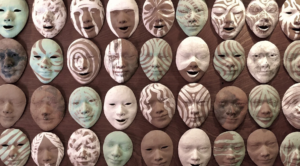Empathy. A trait we are all familiar with. Something that has stuck with us from the early days of childhood to the gruelling, work-filled college years. From comforting a classmate who scraped their knee in kindergarten to supporting a friend through late-night breakdowns over deadlines, empathy has always been a quiet but powerful presence in our lives. It teaches us to listen, to understand, and to feel with others—even when their struggles aren’t our own.
Empathy is a broad and often misunderstood term in today’s age. To fully understand the extent of the word, let’s break it down to its original components: It’s a mix of the Greek word for in (em) and feeling (pathos). The Greek word empatheia inspired its German counterpart : Einfühlung. In 1909, Psychologist Edward Tichiner converted the German word into the English word we know today — Empathy. In its modern sense, Empathy is the ability to be sensitive to another person’s pain, to feel it as deeply as they do, and to respond with appropriate care. It is a fundamental human trait—rooted in us since the dawn of civilisation—and one that continues to be valued and encouraged.
“The biggest deficit that we have in our society and in the world right now is an empathy deficit. We are in great need of people being able to stand in somebody else’s shoes and see the world through their eyes.” Barack Obama said in an interview regarding the state of the world. Despite the original quote dating back a decade ago, it still holds weight in today’s society.
The way we treat each other has only gotten worse throughout the years. With the rise of social media platforms allowing us to hide our true identities behind the wall of anonymity, more people have gotten the courage to say things they would have never said before—now they can get away with it with no real repercussions. Someone disagrees with you? A simple block will suffice and you can continue living in this echo chamber you’ve built for yourself.
The content we take in has a lot to do with how we act. ‘Rage bait’, a term used to describe posting content to elicit an angered response from the other party, and is something that has existed on the internet far before apps like Instagram and Twitter were even created. It’s the easiest way to gain interaction, hence why it’s always associated with the term ‘Engagement farm’. “All publicity is good publicity” Phineas T. Barnum, a 19th century circus owner had once said. Most influencers see the average user as nothing more than a number in their system, and what easier way to get a view, share and comment than to infuriate your viewer to the extent that they feel compelled to leave a comment.
Most social media algorithms work to keep us on the app for as long as they can. According to an insider in The Washington Post who had reviewed internal documents compiled by data scientists behind the app, they theorised that the angry emoji reaction gets about five pushes in the algorithm whereas a simple like only gets one push. Facebook deliberately feeds off negative engagement and pushes such content to more people because it keeps people preoccupied and on the app more.
Facebook isn’t the only platform employing these tactics. It’s no coincidence that the top comment under a tweet or Instagram post is usually the one with the most replies, not necessarily the most likes. This design encourages controversy and confrontation, because comments that spark arguments naturally generate more replies. Social media companies benefit significantly from this dynamic—conflict fuels interaction, and interaction translates to more time spent on the platform, more ads viewed, and ultimately, more profit. In this system, outrage isn’t just tolerated—it’s incentivised.
The over exposure to these anger inducing content only fuels us to be more defensive when we enter the app. Most of the content users come across is either meant to be made fun of (to play the role of a troll) or meant to be scrutinised and nitpicked (to play the role of an educator, far more superior than the poster). This illusion of moral superiority only pushes users further apart. Dave Chamberlin, a writer of The Havok Journal and The Epoch Times, specifies that the reason online hate is so common and instinctive is due to 4 main reasons: Anonymity, Detachment, Social Validation and Low Self-Esteem.
Anonymity is addicting. To the average Joe, being online is a chance to be free—a breath of fresh air from the hustle and bustle of the everyday world. A paradise where they aren’t bounded by the social rules and hierarchy imposed by society. The power the user feels behind the screen is a slippery slope. On one hand, it can help people express themselves more without it tracing back to them and on the other, the lack of accountability can make people more sinister and gnarly than they ever will be in real life.
In Dave Chamberlin’s report, he specifies that malicious behaviour normally stems from deep-rooted insecurities, unmet emotional needs, and a desire for power and attention. The online world shields them from facing actual consequences for their actions. “Hateful comments are often rooted in feelings of inadequacy and a need to assert dominance. These people are often seeking to compensate for personal shortcomings by denigrating others, holding onto the belief that tearing others down will elevate their own self-esteem” He writes.
The online world makes it easy for people to feel detached from how their words affect others. Former professional boxer, Mike Tyson, famously said “Social media made y’all way too comfortable with disrespecting people and not getting punched in the face for it.” Some people carry around a lot of anger, resentment, or a feeling of being powerless in their own lives, and they end up taking it out on others. Posting hateful comments becomes a way for them to release those bottled-up emotions. It gives them a false sense of control or superiority, even though it comes at the cost of someone else’s well-being.
A study overseen by Cambridge and conducted by Harter S. Hirsch and DuBois found that one-third to one-half of teenagers struggle with low self-esteem. It is a behavioural trait that a lot of us adopt through our teenage years, whether it’s due to pressures of society, and its standards or failing to meet our own expectations. However, research shows that there is an alarming decrease in self esteem corresponding to the user’s social media intake.
In the article “Impact of Social Media on Self-Esteem” by Muqaddas Jan, Sanobia Soomro, and Nawaz Ahmad, the authors found that spending one hour per day on Facebook leads to a 5.574-point decrease in an individual’s self-esteem score. In a sample of 150 students, around 88% admitted to making harmful, self-deprecating comparisons that negatively affected their self-esteem.
People can be driven to spread hate online by feelings of envy, frustration, or a strong need to be accepted by others. When someone regularly compares themselves to others and feels insecure or bitter, putting others down can become a way to feel better about themselves. On top of that, wanting to fit in or gain approval from certain online groups can lead them to adopt hateful behaviour just to feel included or noticed.
When a person regularly compares themselves to others, it’s common for feelings of envy to stir in them. It often comes out as an act of malice. Maybe it’s just a ‘like’ for a post with hateful content, maybe it’s a comment meant to scrutinise the poster or maybe it could be a whole page dedicated to trolling and hating on a certain individual. The severity of all these actions vary but the root cause is the same: a severe lack of self esteem and a desperate need for social validation. People succumb to doing online hate for several reasons: one to pat themselves on the back—a ruse to trick themselves—and another to gain recognition from people who either feel or think the same way. Social media makes living in a filter bubble way too easy.
A lot of the anger on the internet is predetermined. If you want to be mad at something, you’ll find something to be mad at. Have you ever realised how even the most uncontroversial piece of media will land itself in heavy scrutiny and hate at times? “Bullies may have deep-seated insecurities and feelings of inadequacy, which they attempt to compensate for by putting others down.” Dave Chamberlin says, “By exerting control over someone else’s emotions through their hurtful words, they temporarily alleviate their own feelings of worthlessness. They often lack empathy, struggling to understand and connect with the emotions of others.”
In the article ‘Electronic Bullying Among Middle School Students’ written by Robin M. Kowalski and Susan P. Limber under the Journal of Adolescent Health, an Official publication of the SAHM (Society for Adolescent Health and Medicine): We learn that, in a sample group of 4000 students from grades 6 to 8 in the United States, 7% of them have been both a cyberbully and a cyberbully victim. The authors suggested that the rates were higher in their study because they didn’t use the term ‘cyberbullying’. Instead, they asked participants about specific actions—like name-calling, making threats, or spreading rumours.
This harmful behaviour slowly but surely seeps into our real world. The way we act online translates to how we act in real life too. We are far too used to the snarky comments left under every post, and memes meant to snarl and mock any and every group of people. It’s so ingrained in us, in our day to day life, that we forget to step back and realise that these are real people we are talking to. In social media, it’s easy to see an account as a mere blob of text and nothing more.
In a world where we depend on social media like a lifeline, empathy—once a natural part of our daily lives—seems to be slipping through the cracks. The same trait that guided us through childhood and all throughout high school, now struggles to survive in digital spaces designed to provoke, polarise, and profit off our feelings and reactions. Algorithms reward outrage, not understanding. Over time, this constant exposure to conflict conditions us to become more reactive, more desensitised, and less willing to consider the feelings of others. We begin to lose touch with empathy not just online, but in real life too—interrupting its quiet role in everyday kindness, patience, and understanding. If we want to reclaim empathy, we have to be intentional about it. It means pausing before we comment, questioning the content we consume, and remembering that behind every screen is a person—not just a profile.







>be me
>”The art of ragebaiting” in my notifs
Mfw when they wrote this without consulting me